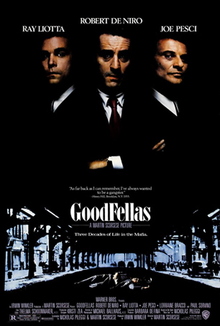
Goodfellas is a 1990 American biographical crime drama film directed by Martin Scorsese, written by Nicholas Pileggi and Scorsese, and produced by Irwin Winkler. It is a film adaptation of the 1985 nonfiction book Wiseguy by Pileggi. Starring Robert De Niro, Ray Liotta, Joe Pesci, Lorraine Bracco and Paul Sorvino, the film narrates the rise and fall of mob associate Henry Hill and his friends and family from 1955 to 1980.

Sleuth is a 1972 mystery thriller film directed by Joseph L. Mankiewicz and starring Laurence Olivier and Michael Caine. The screenplay by playwright Anthony Shaffer was based on his 1970 Tony Award-winning play. Both Olivier and Caine were nominated for Academy Awards for their performances. This was Mankiewicz's final film. Critics gave the film overwhelmingly positive reviews.

Raymond Allen Liotta was an American actor. He first gained attention for his role in the film Something Wild (1986), which earned him a Golden Globe Award nomination. He was best known for his portrayals of Shoeless Joe Jackson in the film Field of Dreams (1989) and Henry Hill in the film Goodfellas (1990). Liotta appeared in numerous other films, including Unlawful Entry (1992), Cop Land (1997), Hannibal (2001), John Q. (2002), Narc (2002), Identity (2003), Killing Them Softly (2012), The Place Beyond the Pines (2012), Marriage Story (2019) and Cocaine Bear (2023).
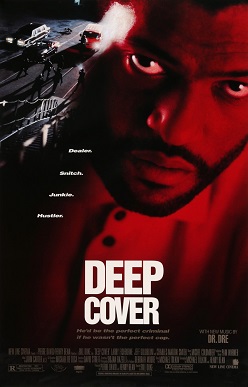
Deep Cover is a 1992 American crime thriller film directed by Bill Duke from a screenplay by Henry Bean and Michael Tolkin. The film stars Laurence Fishburne, Jeff Goldblum, and Charles Martin Smith. Its plot focuses on a Cincinnati-based police officer who goes undercover in a Los Angeles sting operation to bring down a West Coast drug cartel.
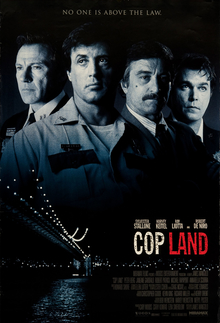
Cop Land is a 1997 American neo-noir crime drama film written and directed by James Mangold. It stars an ensemble cast that includes Sylvester Stallone, Harvey Keitel, Ray Liotta, and Robert De Niro, with Peter Berg, Janeane Garofalo, Robert Patrick, Michael Rapaport, Annabella Sciorra, Noah Emmerich, and Cathy Moriarty in supporting roles. Stallone portrays the sheriff of a small New Jersey town who comes into conflict with the corrupt New York City police officers living in the community. The film received positive reviews and grossed $63.7 million on a $15 million budget.

Love Field is a 1992 American drama film written by Don Roos and directed by Jonathan Kaplan, starring Michelle Pfeiffer and Dennis Haysbert. It was released in the United States on December 11, 1992, by Orion Pictures. It is an example of a representation of the assassination of John F. Kennedy in popular culture. For her performance, Pfeiffer earned an Academy Award nomination for Best Actress.

Bachelor Party is a 1984 American sex comedy film directed by Neal Israel, written by Israel and Pat Proft, and starring Tom Hanks, Adrian Zmed, William Tepper, and Tawny Kitaen. The film revolves around a bachelor party that a group of men throw for their friend Rick Gassko (Hanks) on the eve of his wedding and whether he can remain faithful to his fiancée Debbie (Kitaen).
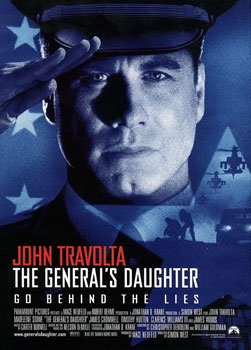
The General's Daughter is a 1999 American mystery thriller film directed by Simon West from a screenplay co-written by Christopher Bertolini and William Goldman, based on the novel of the same name by Nelson DeMille. It stars John Travolta, Madeleine Stowe, James Cromwell, Timothy Hutton, Clarence Williams III, and James Woods. The plot concerns the mysterious death of the daughter of a prominent Army general. The General's Daughter received negative reviews from critics, but was a box-office success, grossing $149.7 million worldwide against an estimated budget of $60 to $95 million.

Narc is a 2002 American neo-noir crime thriller film directed and written by Joe Carnahan and starring Jason Patric and Ray Liotta. The plot revolves around the efforts of two police detectives in search of the murderer of an undercover police officer. As they investigate, they engage in unethical behavior and uncover dark secrets that will challenge their fragile relationship.
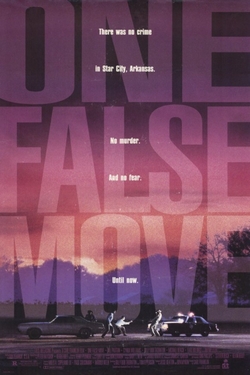
One False Move is a 1992 American crime thriller film directed by Carl Franklin and co-written by Billy Bob Thornton. The film stars Thornton alongside Bill Paxton and Cynda Williams. The low-budget production was about to be released straight to home video when it was finished, but became popular through word of mouth, convincing the distributor to give the film a theatrical release.

A Very Brady Sequel is a 1996 American comedy film directed by Arlene Sanford, with a screenplay by Harry Elfont, Deborah Kaplan, James Berg and Stan Zimmerman, and starring Shelley Long, Gary Cole and Tim Matheson. It also features cameos from RuPaul, Zsa Zsa Gabor, Rosie O'Donnell, Barbara Eden, David Spade, and Richard Belzer.

Unforgettable is a 1996 science fiction thriller film directed by John Dahl and starring Ray Liotta and Linda Fiorentino. The film is about a man named David Krane (Liotta), who is obsessed with finding out who murdered his wife.

House is a 1985 American comedy horror film directed by Steve Miner, with a screenplay by Ethan Wiley, from an original story written by Fred Dekker. Produced by Sean S. Cunningham, the film is the first installment in the House film series, and stars William Katt, George Wendt, Richard Moll, and Kay Lenz. The plot tells the story of a troubled author who lives in his deceased aunt's house and soon falls victim to the house being haunted. It collected $22.1 million worldwide, and was followed by three sequels.

Where the Boys Are '84 is a 1984 American sex comedy film that was directed by Hyman Jack "Hy" Averback and starred Lisa Hartman, Lorna Luft, Wendy Schaal, and Lynn-Holly Johnson. A remake of the 1960 film Where the Boys Are, it was produced by Allan Carr. It was the first film released by Tri-Star Pictures.
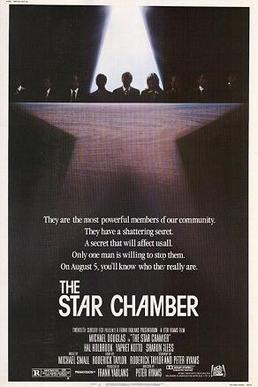
The Star Chamber is a 1983 American crime thriller film starring Michael Douglas, Hal Holbrook,1 Yaphet Kotto, Sharon Gless, James B. Sikking, and Joe Regalbuto. The film was written by Roderick Taylor and Peter Hyams and directed by Hyams. Its title is taken from the name of the Star Chamber, a 15th−17th-century English court.
Jonathan Kaplan is an American film producer and director. His film The Accused (1988) earned actress Jodie Foster the Oscar for Best Actress and was nominated for the Golden Bear at the 39th Berlin International Film Festival. His film Love Field (1992) earned actress Michelle Pfeiffer an Oscar nomination for Best Actress and was nominated for the Golden Bear at the 43rd Berlin International Film Festival. Kaplan received five Emmy nominations for his roles directing and producing the television series ER.
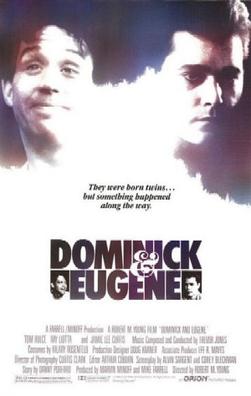
Dominick and Eugene is a 1988 American drama film directed by Robert M. Young about twin brothers, Dominick and Eugene. Dominick has an intellectual disability due to an accident in his youth. The film stars Ray Liotta, Tom Hulce and Jamie Lee Curtis. For his performance, Hulce received a Golden Globe nomination for Best Actor in a Motion Picture Drama.
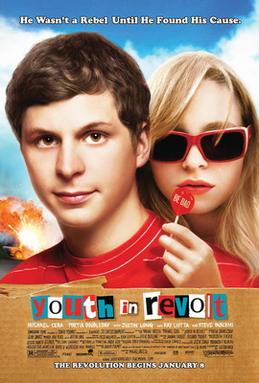
Youth in Revolt is a 2009 American romantic comedy-drama film directed by Miguel Arteta and written by Gustin Nash. Based on C.D. Payne's epistolary novel of the same name, the film stars Michael Cera and Portia Doubleday, with Jean Smart, Justin Long, Ray Liotta, and Steve Buscemi in supporting roles.

The Intruder is a 1953 British drama film directed by Guy Hamilton and starring Jack Hawkins, George Cole, Dennis Price and Michael Medwin. The screenplay is by Robin Maugham and John Hunter, based on Maugham's 1949 novel Line on Ginger.
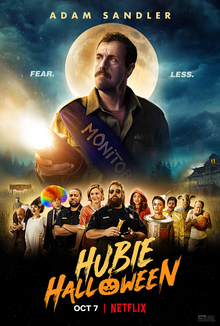
Hubie Halloween is a 2020 American mystery/horror-comedy film directed by Steve Brill, co-written by Tim Herlihy and Adam Sandler, and starring an ensemble supporting cast consisting of Sandler, Kevin James, Julie Bowen, Ray Liotta, Rob Schneider, June Squibb, Kenan Thompson, Shaquille O'Neal, Steve Buscemi, and Maya Rudolph. The film follows a Halloween-loving delicatessen worker who must save the town of Salem, Massachusetts from a kidnapper as various hijinks occur.


















